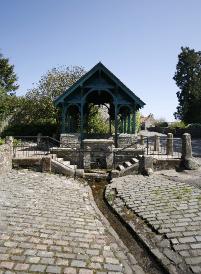 |
||
The purposs o Fons Scotiae is ti propale the ettils o Iain W D Forde ti uise the Scots Tung lik it aye bene the modren naitiounal langage – guid braid Scots.
Scots is the langage o the Laichlauns o Scotland, foundit on the Angliane tung brocht ti the Bret Eyles frae Nor Europ bi the incummers eftir the Roumans gaed hame. Scots alse hes kell-heids frae the kintraes at neipour hir – Eire; the Norse kintraes; Fraince; the Laich Kintraes; an Ingland. Lik aw langages Scots hes daialeks at ir unnerstuid bi ilkane Scots speiker.
Scots rase ti be the cheif langage o the Scotch Court; o the Kirk; o leiteratur, an o the lede, in the centures afoir the Uinioun o the Crouns in eir 1603, bot syne it wure awaw. In speik, sang an poesie Scots is aye ti the foir. Furmal pross hes devaulit, an mote be restaurit.
The purpose of Fons Scotiae is the publication of Iain W D Forde’s venture to use Scots as if it had continued as the modern national language – ‘guid braid Scots’.
Scots is the language of Lowland Scotland, based on the Anglian tongue brought to the British Isles from northern Europe by the post-Roman immigrants. Scots is also sourced from the countries that are her neighbours – Ireland; the Scandinavian countries; France; the Netherlands and England. Like all languages Scots has dialects which are mutually intelligible.
Scots rose to be the chief language of the Scottish Court; of the Church; of literature; and of the people, in the centuries before the Union of the Crowns in 1603, after which it declined. In speech, song and poetry Scots survives. Formal Scots prose has declined and needs to be restored.
The Well at Scotlandwell which the Romans called Fons Scotiae.